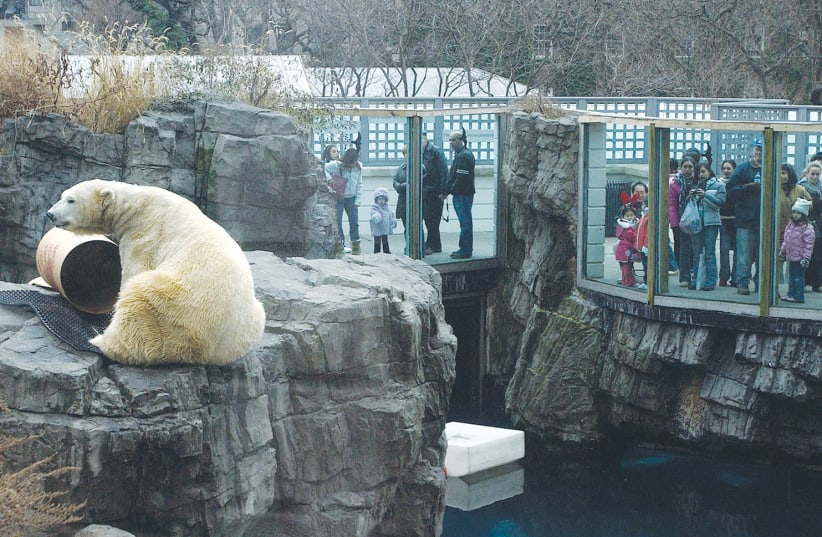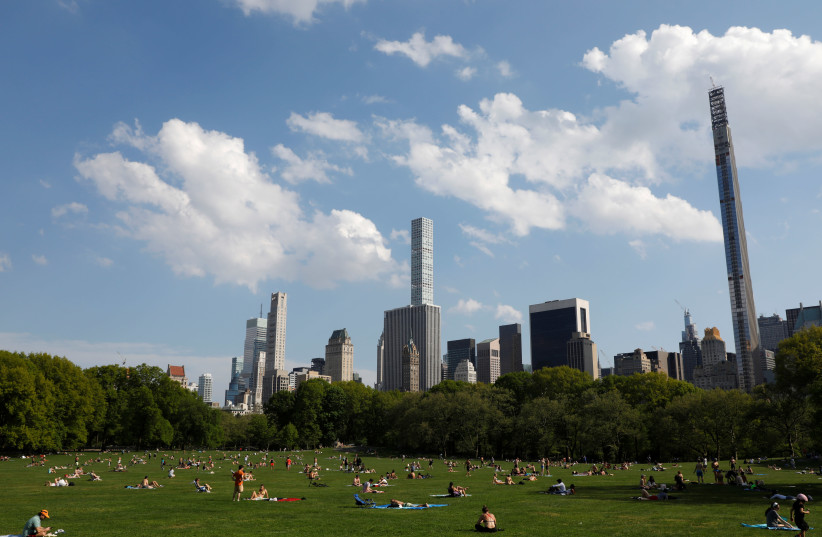This past Passover, I spoke at a retreat in San Diego for Upscale Getaways and was blessed to be joined by my grandchildren. One of the highlights of the fabulous program was the day we spent at the San Diego Zoo, America’s greatest wildlife park. The kids were electrified by the animals of their grandmother’s Australia – the koalas, kangaroos, Tasmanian devils – as well as by the giant Rhinos, hippos and elephants. The only bummer was the meanie China had taken back the Giant Pandas in a move that seemed strangely political.
And while it’s not nearly as vast or diverse, on Sabbaths in New York City, I love taking our children and grandchildren to the Central Park Zoo smack in the middle of Manhattan.
When I was in yeshiva in Jerusalem as a teenager all those years ago, I remember hearing the roar of the lions and the bellow of the elephant from the Biblical Zoo, which was just down the road from our dormitory. It gave me a sense of awe and wonder to know that I loved so close to those majestic animals.
But now zoos have come under incredible assault, as places that are utterly immoral prisons of cages for animals that should be allowed to roam free.
The Torah mandates the prevention of unnecessary pain to animals as a cornerstone of divine ethics. Causing undue distress to living creatures is forbidden. The ancient rabbis ruled that one must feed one’s cattle before feeding oneself, and even the Ten Commandments include domestic animals in the Sabbath rest, as we read just last week in the weekly Torah reading of Va’etchanan.
As for taking animal life for good, most people forget that God commanded Adam and Eve to subsist on vegetation alone: “From all the herbs of the Garden you may eat.” So why does Judaism allow the consumption of meat? A quandary arose after Noah’s flood, which decimated all vegetation, except for the animals in the ark. Had God not permitted Noah’s family to partake of the ark’s animals, they would have perished.
Ever since, there has been an acceptance of the human need to consume meat only as sustenance and Judaism is adamantly opposed to hunting for sport or something as cruel, say, as a fox hunt.
But what about something far more benign, like a zoo? My friend Pamela Anderson, an animal rights activist and actress, with whom I co-authored our book Lust for Love, expressed to me her belief that zoos are cruel and unnatural cages for animals.
No one would fully argue with her point.
As one who visits South Africa and Rwanda, where it’s not difficult to see an authentic animal habitat, I can feel spoiled when it comes to animals and relative to any safari the zoo experience of course feels artificial.
Still, I love zoos, especially the good ones. The miraculous sense of nature that is imparted to children is vital. In Australia, where I recently returned from a speaking tour, our teenage kids were able to pet wallabies that jumped around Sydney’s famed zoo. If we shut down zoos, how will our children experience the beauty of the animal world?
It is naturally uncomfortable
OF COURSE, seeing wild animals penned up unnaturally is uncomfortable. It seems to violate decency. The animals often look restless and bored, which would be a contradiction in any place other than a zoo. Is it pleasant to watch a tiger pacing back and forth in an enclosure wondering, “How the hell do I get out? And how did I get here in the first place?”
Is it inspiring to see beautiful winged creatures only able to fly 30 feet before bumping their beaks into metal grating? No. But many of these zoos serve as places of conservation for otherwise endangered animals.
I will not here address the Sea World orca controversy. There can be no question that the film Blackfish brought urgent scrutiny to how whales are treated in captivity. Yes, these monsters of the deep surely deserve more than a giant swimming pool. But would we appreciate whales as much if the only place we saw them was on National Geographic?
My kids have experienced endless wonder at Sea World in coming face-to-face with a shark, albeit – there it is again – through a glass enclosure. In San Diego, we visited Sea World and our children and especially our grandchildren were further conditioned to appreciate the wonders of the sea.
It’s not fair to say, “If you want to appreciate a marine mammal, go whale watching off the coast of Nova Scotia.” Because then you’re making animal encounters a thing for mostly the rich and privileged.
I’m sensitive to how much controversy zoos now arouse. I asked my followers on social media to chime in. One respondent said, “Many zoos do important work in raising awareness of threatened and endangered species and how human activities impact the environment. Zoos are also for many species a sort of buffer that can help reintroduce species when their numbers dwindle.”
Another supporter of zoos offered, “considering zoos take many animals that have been injured and would surely die in the wild, and that zoos are responsible for preserving certain species that would have gone extinct if not for breeding programs, I think they have their place. If caging an animal that would be dead if not for a zoo is cruel, well, then, I support that kind of cruelty.”
But another reader was livid about any arguments in favor of zoos, “A zoo is an awful place for wild animals. Monkeys in a concrete box with a glass wall for our viewing pleasure, dolphins swimming round and round in a pool; tigers, lions, bears, etc. bored to death with no thrill of hunting or exploring ...Where is the beauty in that?”
And finally, a reader offered a novel idea. “We should be in the small cages for our protection not them for ours. But then we couldn’t stop at the over-priced huts for drinks that increase the bottom line. So, by all means, do what you’re doing because the all-mighty dollar wins out.”
The writer, whom The Washington Post calls “the most famous rabbi in America” will shortly publish Good Mourning: Finding Meaning in Grief and Loss. Follow him on Twitter and Facebook @RabbiShmuley.

